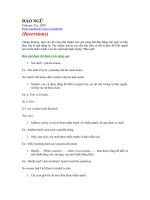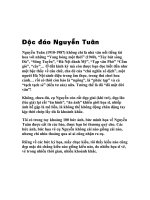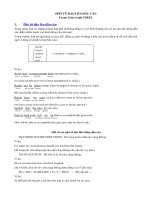dao ngu
Bạn đang xem bản rút gọn của tài liệu. Xem và tải ngay bản đầy đủ của tài liệu tại đây (127.01 KB, 11 trang )
<span class='text_page_counter'>(1)</span><div class='page_container' data-page=1>
<b>EMPHATIC/EXCLAMATORY STRUCTURES/INVERSION</b>
<b>A. Emphatic structures</b>
Emphatic structures are used to emphasise a part of the sentence
<b># Statements</b>
<b>* It is/was + ….+ that/who(m)</b>
Ex: Sue gave Peter a watch for his birthday last week->
- It was Sue that gave Peter for his birthday last week
- It was a watch that Sue gave Peter for his birthday party last week
- It was P. that S. gave a watch to for his birthday party last week
- It was for his birthday that Sue gave Peter a watch last week
- It was last week that Sue gave Peter a watch for his birthday party
<b>* That is/was + question word + S + V</b>
Ex: That’s why he was so upset
<b>* Question word + S + V + is/was</b>
Ex: What her secret was is something that we will never learn
<b>* S + do/does/did + bare inf, in the present or past simple & imperative</b>
Ex: She does eat cereal every morning
They did get a divorceeventually
Do come with us tonight!
<b># Questions</b>
<b>* Is/was it + ….+ that/who(m)…?</b>
Is it your car that is parked outside?
Is it Jane that/who(m) you are going to invite?
<b>* Question word + ever, to express anger, admiration, concern, etc.</b>
Whatever happened to them? They’re late.
<b>* Is/was that + question word + S + V..?</b>
Is that why you don’t want to see him again?
<b>* Question word + is/was it that + S + V …?</b>
Why is it that you are so absent-minded?
<b>B. Exclamatory structures</b>
Exclamatory structures express surprise, shock, fear, anger, admiration etc
<b>What + (a/an) + (adj) + N</b>
Ex: What an interesting story!
What beautiful houses! What bad behaviour!
<b>How + adj/adv + (S + V)</b>
<b>How + adj + a/an + N</b>
How beautiful she is! How tactfully they behave!
How fascinating a story!
<b>How + S + V</b>
How she sings!
</div>
<span class='text_page_counter'>(2)</span><div class='page_container' data-page=2>
I’ve never heard such nonsense!
<b>…so + adj + a/an + N</b>
<b>…so + adj/adv</b>
It was so generous an offer!
He is so polite! She speaks so calmly!
<b>Negative question: Isn’t it funny? Isn’t that a pity?</b>
<b>* Here/There + V + N (inversion)</b>
<b>*Here/There + pronoun + V</b>
Here comes the Prince of Wales.
There he goes!
<b>You + (adj) + N: You (cruel) murderer! You lucky man!</b>
<b>C. Inversion</b>
When some words or expressions (usually with a negative or a restrictive meaning) are at
the beginning of a sentence.The sentence is formed like a question(the auxiliary is placed
before the subject). This is called inversion & is used for emphasis
<b>Words & expressions</b>
<b>-Never (before), rarely, seldom, barely, scarcely…when, hardly (ever)…when, no </b>
<b>sooner than:</b>
Ex: Never in my life had I felt so embarrassed.
Rarely does he use his credit card.
No sooner had I told him the news than everybody in the village knew it.
- <b>Only, not only…but also</b>
Ex: Only when you see her will you realise how much she has changed.
Only in an emergency should you dial 999
Not only did I lock the door, but I also secured the windows
- Expressions with “not”: not (even) once, not often, not until…
Ex: Not even once did she look in this direction
Not until I saw him in person did I realise how tall he was
- Expressions with “no”:On no account, on no condition, under no circumstances,
<b>by no means, at no time, in no way, nowhere…</b>
Ex: In no way is he to blame for what happened
Under no circumstances would he accept my proposal.
- <b>Little:</b>
Little did he know about the surprise that awaited him.
- <b>So/such…that</b>
<b>+ We use inversion with so+adj when the main verb is tobe:</b>
Ex: So bad was the concert that we left during the intermission.
So devasting were the floods that some areas may never recover.
+ Inversion is also used with such and tobe when it has meaning”so much” or “so great”
Ex: Such was the force of storm that trees were uprooted.
This inversion is only used when so or such is placed at the beginning of the sentence.
<i><b>#Attention:</b></i>
</div>
<span class='text_page_counter'>(3)</span><div class='page_container' data-page=3>
Ex: She speaks French and so do her parents. (= her parents do, too.)
The actors performed brilliantly, as did the dancers.
after neither and nor, to agree with negative statements
I don’t like baseball.Neither does my brother. (= my brother doesn’t either)
* with should, were, had in conditional sentences when if is omitted.
If they were to escape, there would be an outcry.
Were they to escape,…
If the police had found out, I would have been in trouble.
Were the police to have found out,…
If you should hear anything, let me know
Should you hear…
If I had known, I would have protested strongly.
Had I known,…
Should you meet John, give him my best regards.
Had there been a telephone nearby, I would have called the police.
in exclamatory sentences beginning with here/there, when the subject is a noun (not a
pronoun)
EX: Here come the bus! But: Here it comes!
Practice: Exercise 1: Rewrite the following sentences:
1. You should never use a lift immediately after an earthquake.
On no account…(should you use a…)
2. She spoke so fast that we couldn’t understand what she was saying.
So fast…(did she speak that…)
3. We had never listened to such an interesting speech.
Never before…(had we listened to…)
4. The driver couldn’t have done too much to avoid the accident.
Little…(could the driver had done to…)
5. Getting the chance to meet someone famous is rare.
Not often…(do you/we (does one) get the chance…)
6. They wouldn’t reject such an offer.
</div>
<span class='text_page_counter'>(4)</span><div class='page_container' data-page=4>
7. Apart from being a talented piano player, Mary is a good violinist.
Not only…(is M. a …,she is also a violinist.)
8. We hardly ever went to my dad’s hometown when I was young.
-> Rarely…(did we go…)
9. Julia had just arrived when the lights went out.
-> No sooner…(had J. arrived than the lights went out.)
10. I never received good marks in Maths at school.
-> Not once…(did I receive…)
11. The waitress told me that the restaurant was about to close & I had scarely started
eating.
-> Hardly…(had I started eating when the waitress…close.)
12. He can’t leave the court until he has testified.
-> Not until…(he has…can he leave the court)
13. I haven’t experienced worse service anywhere
-> Nowhere else…(have I experienced worse service)
14. You mustn’t interrupt me during the meeting
-> Under no circumstances…(must you interrupt…)
15. It was only when the office phoned me that I found out about the meeting
-> Not until…( the office phoned me did I find…)
16. If I had realised what would happen, I wouldn’t have accepted the job.
-> Had…(I realised…)
17. The response to our appeal was so great that we had to take on more staff.
-> Such…( was the response to our appeal that..)
</div>
<span class='text_page_counter'>(5)</span><div class='page_container' data-page=5>
-> Should…(you see…)
19. The driver cannot be blamed for the accident in any way.
-> In…(no way can the driver be…)
20. If the government raised interest rates, they would lose the election.
-> Were…( the government to raise…)
21. As soon as I got into the bathroom, someone knocked at the door.
-> No sooner…(had I got… than someone knocked…)
22. There was so much uncertainty that the financial markets remain closed.
-> Such…(was the uncertainty that…)
23. It’s not common for there to be so much rain in March.
-> Seldom …(is there so much…)
24. You won’t be allowed in until your identity has been checked.
-> Only…(when your…will you be allowed in)
25. Just after the play started there was a power failure.
-> Hardly…(had the play started when there was…)
26. We had only just arrived home when the police called.
-> Scarcely…(had we arrived home when…)
27. Press photographers are banned from taking photographs backstage.
-> On no…(account are the Press photographers allowed to take..)
28. The way so much money has been spent to so little purpose must be a record!
-> Never before..(has so much been spent to so little purpose)
</div>
<span class='text_page_counter'>(6)</span><div class='page_container' data-page=6>
-> Should …(he have cheated,…)
Exercise 2: Rewrite the sentences so that it contains the given word(s) in brackets.
1. Were Smith to resign, I might stand a chance of getting his job.(IF)
If Smith were to…
2. Such was the demand for tickets that people queued day & night.(GREAT)
The demand for tickets so great that…
3. The money is not to be paid under any circumstances.(NO)
Under no circumstances is the money to be paid
4.Three days passed before we arrived at the first oasis.(NOT UNTIL)
-> Not until 3 days had passed did we arrived…/It was not until 3 days later that we arrived..
5. Hardly had the ship left port, when a violent storm developed.(soon after)
-> Soon after had the ship left port, a violent storm…
6. They would have discovered land sooner had they carried a compass(IF)
-> If they had carried…
7. Little did Brenda know what she was letting herself in for.(IDEA)
-> B. had no idea what she…
8. It was only when I stopped that I realised something was wrong(DID I)
-> Only when I stopped did I realised…
9. The accused never expressed regret for what he had done(AT NO TIME)
-> At no time did the accused express regret…
</div>
<span class='text_page_counter'>(7)</span><div class='page_container' data-page=7>
<b>INVERSION : ĐẢO Ở MỆNH ĐỀ 1</b>
<i><b>1. Nhóm mang nghĩa phủ định (never)</b></i>
- Little: (ít) Nhằm hạn chế nghĩa của câu
E.g. Little do I understand the lesson although I have learned it for a long time.
- No where: (không ở đâu)
E.g. No where can you find a beautiful place than Hanoi.
- Rarely, Scarcely, Seldom, Hardly, Barely (hiếm khi)
E.g. Rarely do American shake hands to say goodbye.
- On no account
<b> By no means E.g. On no account does she eat meat</b>
- Under no circumstances
<b> In no circumstances E.g. Under no circumstances will I forget him.</b>
- At no time, In no way, on no condition, etc. E.g. At no time do we go to school late.
- Never E.g. Never in my life will I forget my idol.
- Neither
<b> Neither ....nor... E.g. Neither does he drink alcohol nor he smokes because both of </b>
them are very harmful for his health.
- Not once (không chỉ một lần) E.g. Not once do I study this lesson.
- In vain (vơ ích, vơ vọng) E.g. In vain does she borrow him money because he is very
mean.
- Not any + N + clause, .... E.g. Not any improvement will you make unless you work
hard now.
<i><b>2. Nhóm khác:</b></i>
- Far too often (quá thường xuyên)
</div>
<span class='text_page_counter'>(8)</span><div class='page_container' data-page=8>
- So, Such
Nếu câu có Adj thì Adj sẽ đứng ngay sau “So” rồi đảo ngữ.
E.g. Such is the life.
So expensive is this picture that nobody in my class can buy it.
- Trạng ngữ (thời gian, nơi chốn ...) E.g. Next to an article is a photograph of him.
- Đảo ngữ với tiểu từ E.g. Off took the plane.
- Câu điều kiện:
<b> Bỏ liên từ “If” đảo trợ động từ lên trước.</b>
Câu phủ định cũng không đảo “not” lên đầu.
E.g. Do we not leave now, we’ll miss the train.
Chú ý! Chú ý! Chú ý!
Câu chỉ xuất hiện đảo ngữ nếu những từ trên đứng ở đầu câu hoặc mệnh đề.
<b>EXERCISES</b>
<b>Ex1: Put the verb into the correct form:</b>
1. Never he (visit) me last year.
2. Here (come) your wife.
3. Here (be) your book.
4. Scarcely she (go) to school on time.
5. Not once she (do) that work for him a year ago.
6. We read that book many times, little I (understand) it.
7. We have learnt English for a long time, little I (improve) my level.
8. All too often she (come) back home late. Her parents were very angry.
9. In vain you (do) this work because it is useless.
10.On no account she (learn) hard.
11.In no circumstances, she (buy) that book because it’s very expensive.
12.No where you (find) as beautiful and gentle as Ha Long Bay.
13.In the past, neither I (love) him.
14.So beautifully she (sing) that all audiences seem to be death silence.
15.Now spring (come).
16.Then (come) your husband.
</div>
<span class='text_page_counter'>(9)</span><div class='page_container' data-page=9>
1. She never suspected that her money had been stolen. (At no time)
2. I have never seen such a stupid in my life. (Never)
3. There is a picture of a dolphin next to the news. (Next to)
4. He goes to the library twice a week to borrow books. (Twice)
5. She is so beautiful that I can’t help looking at her. (So)
6. If I were a flower, I would be a rose. (Were)
7. If you had told me this, I wouldn’t have come. (Had)
8. They have been so successful that they often avoid meeting reporters. (So)
9. Her beautiful was such that we could only stare. (Such)
10.She didn’t say a word. (Such)
11.I hardly understand what he meant. (Hardly)
12.This switch must be touched on no account. (On no account)
13.He became so suspicious that he did not believe any one. (So)
14.If I were you, I would keep my promise. (Were)
15.She seldom goes to church. (Seldom)
16.There would have been an interesting party if the weather had been fine. (Had)
17.The rocket went up. (Up)
18.The tree fell down. (Down)
19.Sue armed guard stood by the door. (By)
20.Ann is here. (Here)
21.The bus goes there. (There)
22.The train comes here. (Here)
23.The runner went away. (Away)
24.The plane flew round and round. (Round and round)
<b>INVERSION: ĐẢO Ở MỆNH ĐỀ 2</b>
I.
Only when ( chỉ khi)
Only after
Only before
Only in
Only by + trạng ngữ
…
Not till
Not still
Not until ( cho đến tận khi)
E.g. Only when they are introduced, do they usually shake hands.
</div>
<span class='text_page_counter'>(10)</span><div class='page_container' data-page=10>
Đảo ngữ ở mệnh đề số 2. ( trợ động từ được đảo lên trước chủ ngữ)
II. Exercises:
<b>Ex1: Put the verbs in the correct forms:</b>
1. Only when studying English hard, you (improve) your English level.
2. Only in unhappiness, people (understand) the real value of happiness.
3. Not till she (buy) that book, she (know) it was interesting.
4. Not until I (know) that fact, I (understand) he is a good person.
5. Only after practicing cooking that meal, Tim (realize) that it was not easy to do.
<b>Ex2: Rewrite the sentences so that the meaning is not changed.</b>
1. She speaks English only when she is in class.
Only when
2. I only realize it then.
Only then
3. He is only nice with the presence of Jane.
Only with
4. He did not realize he had lost it until he got home.
Not until
5. He was able to make himself heard only by shouting.
Only by
6. He asked us to help only when he was too tired.
Only when
</div>
<span class='text_page_counter'>(11)</span><div class='page_container' data-page=11></div>
<!--links-->









